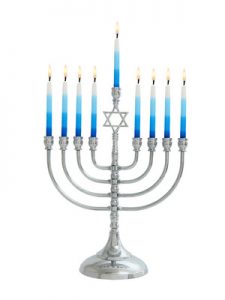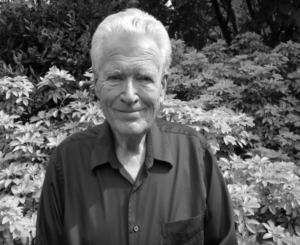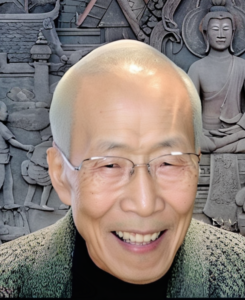In the coming year we will be publishing reflections around the time of big festivals of the many religions represented in IARF. We begin with Chanukah, the Jewish festival of light. The author of this piece is Rabbi Robert Carroll, member of the International Council, our governing body, and the Interfaith Encounter Association, one of our Middle Eastern member groups.
Jewish historical memory reflects a constant tension between the particular and universal. To give one example: The Exodus from Egypt was on one level the story of a major incident in the life of a very minor people. It can be read as nothing more than that. But the God of the Exodus is also the God of all humanity and the Exodus, in Jewish teaching, foreshadows the Redemption that God will one day bring to all peoples. For Jews, to remember the Exodus is also to work hand in hand with God to bring that day about. So too the story of Chanukah – on one level it’s only about one small nation fighting for its cultural survival. But on a deeper level it contains many messages for all of us.
people. It can be read as nothing more than that. But the God of the Exodus is also the God of all humanity and the Exodus, in Jewish teaching, foreshadows the Redemption that God will one day bring to all peoples. For Jews, to remember the Exodus is also to work hand in hand with God to bring that day about. So too the story of Chanukah – on one level it’s only about one small nation fighting for its cultural survival. But on a deeper level it contains many messages for all of us.
The basic story is well-known from the Books of Maccabees and the historical writings of the historian Flavius Josephus:
In the 2nd century BCE Antiochus Epiphanes, king of the Seleucid (Syrian) remnant of Alexander the Great’s empire, began a campaign to forcibly Hellenize the Jews of the land of Israel. A statue of Zeus was erected in the Holy Temple in Jerusalem. Pigs were sacrificed on God’s altar, in brazen defiance of God’s command. Those who kept the Sabbath or circumcised their sons, as Biblical law requires, were executed.
Though the Seleucids had the support of the High Priest and elements of Israelite society, a rebellion quickly took root, led by a group of priests from Modi’in, Mattathias and his son Judah (known as Judah the Maccabee). Despite suffering many initial defeats their guerilla war was successful, recapturing Jerusalem within three years. The word “Chanukah” simply means “rededication” and refers to the eight days of celebration which then took place. Talmudic legend relates that although only one cruze of ritual oil had remained undefiled, it miraculously burned for eight days – hence the origin of the Jewish custom of lighting a Menorah, or 8-branched candelabrum, adding a successive candle during each night of Chanukah.
As we can now see, the Chanukah story is one of a particular people fighting for its religious and cultural self-determination. But like the story of the Exodus, it has elements that speak to all of us.
One of the greatest modern-day Jewish sages, Rabbi Abraham Isaac Kuk, taught that all peoples and cultures reflect and embody the light of God; just as God is infinite, God’s wisdom – His light – shines forth in manifold forms, and in all nations and faiths. Josephus fittingly coined the phrase “Festival of Lights” to describe Chanuka, and indeed over the centuries, the symbolism of light and flame came to be the holiday’s dominant motif. It speaks to us today in more ways than one: Do we want to bring warmth and illumination to the world, or do we want to be arsonists who burn and destroy?
The Chanukah story is almost 22 centuries old, yet it seems that in our day more than ever, the idea of freedom is at risk from those who would use the fire of faith to consume and oppress rather than to illuminate, to show compassion, or to perceive the holiness that all people as children of God have within themselves.
Ultimately, this is the question that Chanuka asks us: What kind of lights do we want to kindle in our world?






